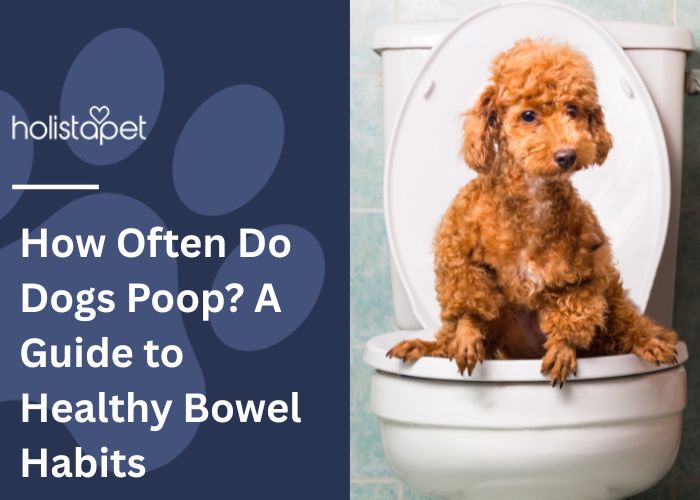If you're a new pet parent, you're probably wondering, "How often do dogs poop?" Most adult pups stick to a routine, going poo around one to three times a day, and that routine says plenty about their health. Their diet, exercise, and daily habits all influence their poop schedule.
Owners who pay close attention to their pet's potty breaks can better spot issues early. What you want is a regular bathroom rhythm, which means a happy, healthy pooch overall.
Why Pooping Frequency Matters for Your Dog's Health

How often a dog eliminates shows how well their body digests food. A steady schedule points to good health, while sudden changes may signal an issue. Owners who pay attention during potty breaks can catch problems early. Too few or too many trips outside often mean it's time to take a closer look.
How Often Should Dogs Poop?
Most adult dogs poop one to three times per day. Puppies often go more, while senior dogs may slow down. A normal schedule depends on diet, age, and activity. Dog parents should watch for consistency rather than focus on a single number. A steady pattern usually means your furry friend’s digestion works the way it should.
Factors That Affect How Often Dogs Poop

Several factors shape a pup's potty schedule. Owners who understand these influences can better track what’s considered normal:
- Age
- Diet and Fiber Intake
- Exercise and Daily Activity Levels
- Breed and Size Differences
- Stress or Environmental Changes
Age – Puppies vs. Adult Dogs vs. Seniors
Puppies usually eliminate several times per day because their small bodies process their meals quickly. Most adult pups settle into a steady rhythm of one to three bathroom trips daily. Older dogs, on the other hand, may slow down as digestion changes with age.
Diet and Fiber Intake
A dog's diet plays a direct role in how often they poop. Meals with balanced nutrition and the right fiber content help digestion stay regular. Too little fiber may cause constipation, while too much can lead to loose bowels.
Exercise and Daily Activity Levels
Regular walks and play keep a dog's digestion moving. Active canines often eliminate on a predictable schedule because activity helps food pass through the body. Less movement can slow things down, leading to fewer potty sessions.
Related Post: How Much Exercise Does a Dog Need? Puppies, Adults, & Seniors
Breed and Size Differences
Breed and size can also influence a dog's potty schedule. Small pups may poop more often because their bodies process food faster. Large breeds often have fewer bowel movements, but the feces are bigger in size. Most dogs still fall within the one to three times per day range.
Stress, Anxiety, or Environmental Changes
Dogs may poop more or less often when their environment changes. Moving homes, new routines, or loud noises can upset their schedule. Stress can lead to loose bowels, while fear of being alone may slow down the bathroom session.
Pro Tip: If you suspect your dog is dealing with stress or fear, Holistapet offers calming CBD dog treats, chews, and drops. Provide some daily or before stressful events for a calmer, more comfortable demeanor. All treats are made with 100% natural and high-quality ingredients.
What Healthy Dog Poop Looks Like

A healthy dog's stool stays firm, looks like a log, and is easy to pick up. Normal color ranges from medium to dark brown. Soft, hard, or oddly colored feces may point to trouble. Pet parents who check their companion's poop regularly get quick clues about their furry buddy's overall health.
When Stool Appearance Signals Trouble
Some colors point to problems that need attention. Watch for these shades:
- Black/Tarry – may signal bleeding
- Red Streaks – often come from irritation near the end of the tract
- Yellow/Orange – may mean food moves too quickly
- Gray/Clay-Colored – can show a blockage
- Green – may suggest eating grass or other parasites
Textures and Consistencies to Watch For
Poop texture also gives clear clues about your dog's digestion. Any of these may point to trouble:
- Very Hard, Dry Stools – may signal constipation
- Watery Diarrhea – often linked to stomach troubles
- Mucousy/Jelly-Like Coating – could show irritation
- Greasy/Oily Appearance – suggests food isn’t fully digested
- Foamy or Frothy Stool – may point to an underlying issue
Related Post: How To Firm Up Dog Poop: Simple Fixes That Work
Common Reasons for Irregular Bowel Movements

Dogs sometimes struggle with irregular bathroom schedules. Skipping breaks or going too often usually signals a problem worth noticing. Here are a couple of culprits to watch for:
- Constipation in Dogs – often linked to diet, dehydration, or lack of exercise
- Loose Stool or Diarrhea – may come from unfamiliar food, stomach troubles, or other parasites
Can Probiotics Help Regulate Pooping Frequency?

Probiotics help keep a dog's potty schedule regular by supporting balance in the gut. They add beneficial bacteria that help improve digestion and reduce stomach troubles.
HolistaPet's Probiotic Soft Chews for Dogs contain a blend of 9 strains with 3 billion CFU, including Lactobacillus and Bifidobacterium varieties. These chews promote healthy digestion, steady poop schedules, and overall wellness.
When To Be Concerned About Your Dog's Poop Schedule

A steady schedule usually means things are normal. But when patterns shift, it may point to a problem that needs quick attention. If you notice these changes, call a vet immediately:
- Pooping Less Than Once Per Day
- Frequent Diarrhea or Loose Stool
- Bloody Poop or Red Streaks
- Straining or Clear Discomfort
- Sudden Shifts in Poop Frequency
Tips To Support Regular and Healthy Digestion in Dogs

Keeping digestion steady helps your pooch maintain a predictable poop schedule. Small daily habits like these are always a win:
- Feed a Balanced Diet
- Provide Consistent Meal Times
- Offer Plenty of Fresh Water
- Maintain Daily Exercise
- Limit Sudden Dietary Changes
- Monitor Treat Intake
- Schedule Regular Vet Checkups
FAQ – How Often Do Dogs Poop?
Dog owners often wonder what counts as normal when it comes to a pup's poop schedule. Frequency can vary, but certain patterns are common. These answers clear up the most frequent questions and help you know what to expect.
Is it normal for a dog to poop once a day?
Yes, many dogs poop once a day, and that's considered normal. Most adult pups follow a steady routine based on their diet and activity level. Some dogs may go more often, while others stick to one solid session. If the schedule stays regular, it usually signals good health.
Should dogs poop after every meal?
Many dogs feel the urge to poop after eating, but not all will go every time. Young pups often need bathroom breaks right after meals, while most adult dogs stick to one to three times per day. A regular pattern that matches your dog's unique situation shows their digestion works the way it should.
Why is my dog pooping more than usual?
A dog may poop more often when eating new dog food, getting extra treats, or dealing with stomach troubles. Stress or other parasites can also affect frequency. If the change lasts more than a day or two, it may mean an underlying issue. Monitor closely and call a vet if needed.
How long can a dog go without pooping?
Going longer than 48 hours without a bowel movement may signal constipation or another problem. Dogs who skip bathroom breaks often show signs of discomfort. Owners who see their pup straining or avoiding trips outside should reach out to a veterinarian for additional advice.
Can a sudden change in food affect poop frequency?
Yes, new or unfamiliar food can cause changes in a dog's poop schedule. Switching brands too quickly, for example, often leads to loose stool or more frequent bathroom breaks. Gradual dietary changes help prevent these issues. If you're introducing new food, do it slowly and observe your pup's potty trips to make sure their digestion adjusts smoothly.
Final Thoughts - How Often Should My Dog Poop?
Most dogs poop one to three times per day, but the exact number varies by age, diet, and activity. A steady schedule with healthy waste usually signals that digestion works properly. If you closely monitor changes, you can catch problems early and support your best friend's overall health.
HolistaPet offers natural products like probiotics to keep digestion steady and dogs feeling their best. Supporting regular bowel movements means more than just a clean yard. It means comfort, balance, and happiness for your pup. Remember, every bathroom break is another step toward a healthier, brighter life together.
Find more practical dog care advice here.


 CBD Oil for Dogs - Fast Acting
CBD Oil for Dogs - Fast Acting
 Chicken Flavored CBD Oil For Dogs - Easy Dose
Chicken Flavored CBD Oil For Dogs - Easy Dose
 Salmon Flavored CBD Oil For Dogs - Highly Rated
Salmon Flavored CBD Oil For Dogs - Highly Rated
 CBG Oil for Dogs and Cats - Loved by Thousands
CBG Oil for Dogs and Cats - Loved by Thousands





Leave a comment
All comments are moderated before being published.
This site is protected by hCaptcha and the hCaptcha Privacy Policy and Terms of Service apply.